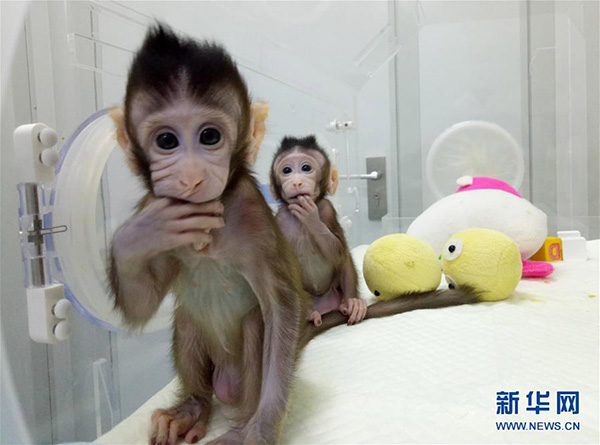


Long-tailed macaques Zhong Zhong and Hua Hua
China has no plans to conduct human cloning following the success of its monkey trial, according to a report by Chinese newspaper Science and Technology Daily.
The recent birth of two identical long-tailed macaques - Zhong Zhong and Hua Hua - marked the first time primates have been cloned using the same cloning technique that made Dolly the sheep.
While the achievement was seen as a breakthrough, critics raised ethical concerns about the research and suggested it could ultimately lead to human cloning.
However, in order to suit the rapid development of biotechnology, China formed an ethical review system for scientific research in the 1990s. A committee has also been established in accordance with the request of ethical assessment of international projects.
In addition, a series of codes and regulations have been formed to guide scientific research, restraining and even closing those substandard projects.
According to a document issued by the country’s Ministry of Science and Technology in December 2003, human reproductive cloning is prohibited. Though therapeutic cloning is permitted, it must conform to the codes, the document said.
 Fire brigade in Shanghai holds group wedding
Fire brigade in Shanghai holds group wedding Tourists enjoy ice sculptures in Datan Town, north China
Tourists enjoy ice sculptures in Datan Town, north China Sunset scenery of Dayan Pagoda in Xi'an
Sunset scenery of Dayan Pagoda in Xi'an Tourists have fun at scenic spot in Nanlong Town, NW China
Tourists have fun at scenic spot in Nanlong Town, NW China Harbin attracts tourists by making best use of ice in winter
Harbin attracts tourists by making best use of ice in winter In pics: FIS Alpine Ski Women's World Cup Slalom
In pics: FIS Alpine Ski Women's World Cup Slalom Black-necked cranes rest at reservoir in Lhunzhub County, Lhasa
Black-necked cranes rest at reservoir in Lhunzhub County, Lhasa China's FAST telescope will be available to foreign scientists in April
China's FAST telescope will be available to foreign scientists in April "She power" plays indispensable role in poverty alleviation
"She power" plays indispensable role in poverty alleviation Top 10 world news events of People's Daily in 2020
Top 10 world news events of People's Daily in 2020 Top 10 China news events of People's Daily in 2020
Top 10 China news events of People's Daily in 2020 Top 10 media buzzwords of 2020
Top 10 media buzzwords of 2020 Year-ender:10 major tourism stories of 2020
Year-ender:10 major tourism stories of 2020 No interference in Venezuelan issues
No interference in Venezuelan issues
 Biz prepares for trade spat
Biz prepares for trade spat
 Broadcasting Continent
Broadcasting Continent Australia wins Chinese CEOs as US loses
Australia wins Chinese CEOs as US loses